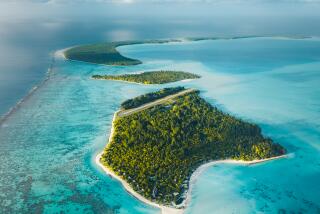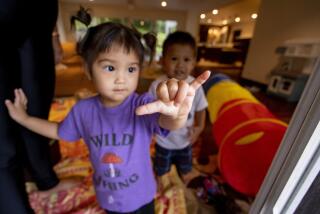Fiji: Beauty, warm waters and a range of lodgings
Fiji is one of those island daydreams you can’t believe still exists.
The ocean is warm, turquoise, clean, and little in it stings or bites. The people are exuberantly welcoming, the drinking water is filtered. The food is safe and, in the upscale places, worthy of Michelin stars.
Despite a spate of recent development, it’s no Bora Bora, where development stacks upon development.
But American travelers have largely stopped frequenting Fiji’s virginal white beaches and simple but heavenly resorts since the military took over the government in a 2006 coup.
It’s their loss.
The word “coup” strikes fear into the hearts of travelers -- understandably so. But this one in Fiji was gentlemanly and bloodless. It was even postponed for a day because of an important rugby match. Not a shot was fired, not a life lost. Most of the locals on the 300 outer islands heard about it days later, shrugged and got on with their lives.
Ignoring caution, my husband, Greg, and I decided to return to the islands, our first visit in 10 years. We were drawn by the Savusavu Music Festival, an annual event that brings in music groups from all over the South Pacific, and we were celebrating our 20th wedding anniversary. And then there is the small thrill we derive from ignoring travel warnings -- unless artillery is involved. It wasn’t.
This chain of more than 300 islands is at the westernmost edge of what is considered the Polynesian triangle of the South Pacific (the three tips being Hawaii, Easter Island and New Zealand). But the islanders are a mix of races and cultures, predominantly Melanesian-Polynesian, Indian and the descendants of European settlers. They are gracious, hospitable and friendly. We didn’t encounter any resentment toward tourists.
Fiji has accommodations to suit all budgets -- from $20-a-night hostels to $3,000-a-night establishments, all with the same tropical-perfection setting.
The spate of recent development, though, has now put Fiji on the discerning traveler’s list. The Likuliku Lagoon Resort is the latest upscale property to open, and that was our first stop.
Likuliku is in the Mamanuca island chain, a two-hour ferry ride from Nadi (pronounced NAN-dee) and the closest white-sand-beach islands to the mainland of Viti Levu, where the airport is.
The resort has 46 rooms and boasts Fiji’s first over-the-water bungalows, Tahiti style.
Not a big fan of over-the-water living, I booked a beachfront bungalow. It was about 600 square feet, built in the traditional way with intricate, hand-carved poles and a thatched roof. It had an outdoor shower, a plunge pool and a day bed above the sand, set at the optimum angle for watching sunsets. A few steps off our deck was a beach so white and water so aquamarine that it was like a backdrop from “The Truman Show.”
Our days would go like this: We would wake up late, head to the open-sided restaurant for some breakfast and discuss whether to go kayaking or hike one of the islands. We’d make great plans, then head back to our room, take a swim, go snorkeling right in front of the room, eat lunch, take a nap and never go anywhere. We were so soothed by the tranquillity, food was the only thing to entice us from our daybed.
Our next stop was Royal Davui Island Resort, an upscale, 16-room resort on a private island off southern Viti Levu. The only way to get there is by helicopter, which picked us up in a pasture near Nadi. The resort, which opened two years ago, is owned and operated by a Fijian family, descendants of colonial settlers.
Our room was a luxurious villa on a lush cliff, with sitting room, deck, outdoor plunge pool, spa bath in the bathroom and a large bedroom with slide-away glass walls, all with uninterrupted views of the sea below.
There was even a “pillow menu” next to the bed, so that if we objected to the texture of the one provided, we could summon another kind. This may be de rigueur at the retreat spots for the world’s rich and famous, but such a small thing spoke of a new era of hospitality for Fiji.
We overcame our lethargy at the Royal Davui, once I saw a flier for a shark dive -- without a cage. We couldn’t pass that up.
Fiji has a healthy population of sharks, many of them the larger, more dangerous breeds such as tigers and bulls. Amazingly, however, there are rarely shark attacks.
We left by boat early the next morning to head to the Beqa Lagoon to meet up with Aqua-Trek, the company that runs the shark dives.
“OK,” the Fijian dive master told us. “A couple of rules. Don’t stick your hands out, don’t pet the sharks unless we tell you to, and don’t go swimming off by yourself. Righto? Let’s go.”
The sharks are lured in with chum, which comes down in huge garbage cans. We dived to 80 feet and settled next to a coral head, kneeling on the sandy bottom. As soon as the chum appeared, there was a frenzied cyclone of fish, some silvertip and nurse sharks, all of which arrived in seconds. One by one, we were led into the fray and permitted to pet the flat-headed nurse shark, which ignored us and kept ripping into the fish bits. Its skin felt like fine sandpaper.
I was happily hanging out, marinating in chum, when the fish turned tail and, in a single reflex, fled, like an underwater stampede. Feeling like the unpopular kid left in the schoolyard, I wheeled around, searching for the cause. Moments later, a 14-foot tiger shark (the kind that took the right arm of Bethany Hamilton as she surfed off Kauai) loomed into view, patrolling the joint like a mobster.
There is some innate fight-or-flight reaction when an enormous shark is cruising nearby. They move deceptively slowly, staring with a beady-eyed insouciance, perfect killing machines. I can only describe the feeling as similar to the one I have when I’m speeding and a police cruiser glides into my rearview mirror. But there is no describing quite how thrilling it was -- and my kids would think I was so cool when I showed them the video.
Honeymooner’s ideal
From the Davui, we rode the helicopter back to the mainland, then took a four-hour boat trip west to the Yasawa Islands, probably the most classically tropical of the Fiji islands. They also have the best weather, getting less rain than the rest.
A string of powdery beaches, tropical brush, friendly villages and the bluest water imaginable make the Yasawas every romantic’s ideal.
We had booked a room at the barefoot-chic Navutu Stars, a new mid-range resort that is younger, more casual and hipper than the Likuliku and Royal Davui.
It was also about half the price. It’s run by an Italian couple who lease the land from the local village, and it has an organic feel to it. It’s the kind of place that has lounge music playing 24/7 and where people wear sarongs, surf shorts and lots of ethnic jewelry. I loved it.
The nine bungalows were simple and Mediterranean in style with whitewashed stucco, fresh hibiscus flowers on the bed and shells adorning the walls. It was marooned in the middle of miles and miles of blissful beaches and staffed by warmhearted villagers.
Twice a day, snorkeling trips or village visits were planned. I spent a thoroughly delightful afternoon at a nearby village where the women assembled in the community hall -- a cinder-block room with no furniture -- so they could sell shell jewelry, nothing priced above $10.
You can scuba dive in the Yasawas, although the diving is superior on Vanua Levu, the large, northern island in the Fiji chain and home to the Jean-Michel Cousteau Resort, where we met up with friends for the Savusavu Music Festival.
The town of Savusavu is about as authentically Fijian as it gets. In 1994, California-based Passport Hotels bought a neglected resort on Vanua Levu and spent millions remodeling it, turning it into a mix of family getaway, dive resort and honeymoon retreat.
The place is staffed with exuberant Fijians, who whisk the offspring off in the morning and return them, tired and glowing, at the end of a day of pool play, native crafts and more. Divers love it because it has world-class diving. Honeymooners love it because there is more to do than sit on a beach, if that’s what they are looking for.
After flying from Nadi to Vanua Levu, we were driven across the island and to the end of a dirt road, site of the resort. A smiling woman awaited us at our enormous beachfront bungalow. Instead of handing us the typical juice and lei, she gave us a foot massage. I was sold.
Diving and dancing
Jean-Michel Cousteau, son of the legendary Jacques, came onboard to ensure that the hotel became one of the best eco-dive resorts in the world. In his eyes, the diversity of life on Fiji’s reefs is unparalleled, and he ranks Namena Island, a site close to the resort, the best dive in Fiji and among the top 10 dive sites in the world. Having now done it, I would concur.
The Cousteau resort also co-hosts the Savusavu Music Festival, which celebrates and encourages current generations to maintain indigenous island music. The dances had a modern, interpretive feel. They were indigenous, yes, but it was a next-generation indigenousness, some even were performed to island-style rap.
I was glad to witness a thriving South Pacific culture everywhere we went. This may be a new era for Fiji, with world-class resorts, helicopters and private islands, but ultimately one thing matters. It is still a place of simplicity, astonishing beauty and gracious people.
More to Read
Sign up for The Wild
We’ll help you find the best places to hike, bike and run, as well as the perfect silent spots for meditation and yoga.
You may occasionally receive promotional content from the Los Angeles Times.






